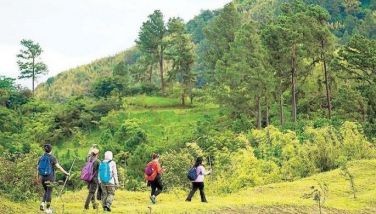RP urged to oppose further tariff cuts
December 23, 2005 | 12:00am
Developing countries like the Philippines should oppose further tariff reductions in view of the turtle-paced elimination of subsidies by rich countries such as the European Union (EU), a non-government organization said.
Alyansa Agriculture (AA), the largest coalition of farmer-fisherfolk groups in the Philippines, said the country’s agriculture sector needs to be protected from more tariff cuts until such time that the developed world begins to phaseout their trade-distorting subsidies.
"We are disappointed that the elimination of the European Union export subsidies has been extended to the very far away date of 2013. Because the Alyansa considers leveling the playing filed as leveling not only tariffs but the summation of tariffs and subsidies across countries, we believe that we should oppose further tariff reductions in light of the very slow elimination of subsidies of other countries."said AA national coordinator Ernesto M. Ordoñez.
Ordoñez also pointed out that the exact formulas for implementation of provisions agreed upon at the recent ministerial conference in Hongkong, will still be negotiated in Geneva in the next six months.
"What this means is that if the formulas for good provisions such as special products, special safeguard mechanisms, and exemptions from tariff bindings for non-market agricultural access or NAMA products like fisheries are done in an unfavorable way, the gains from this past conference can turn into disaster if our negotiators abandon their advocacy in the next six months when the real decisions on the WTO formulas and details take place," Ordoñez said.
AA and other agriculture non-government organizations said the government negotiators should continue to be vigilant throughout the period until April 2006 when countries will begin the earnest task of hammering out modalities that will be the basis for implementing global trade reforms in agriculture.
"The first round of talks was successful in Hong Kong and we are confident the next rounds of negotiations in Geneva next year will be concluded favorably," said Agriculture Secretary Domingo F. Panganiban earlier.
The negotiations will shift to Geneva to fasttrack the full set of modalities in all negotiating fronts within the first quarter of next year.
Panganiban said the G-45 is satisfied with the revised ministerial text that would enable countries to identify their sensitive products that can enjoy protection from import surges and further tariff cuts.
Alyansa Agriculture (AA), the largest coalition of farmer-fisherfolk groups in the Philippines, said the country’s agriculture sector needs to be protected from more tariff cuts until such time that the developed world begins to phaseout their trade-distorting subsidies.
"We are disappointed that the elimination of the European Union export subsidies has been extended to the very far away date of 2013. Because the Alyansa considers leveling the playing filed as leveling not only tariffs but the summation of tariffs and subsidies across countries, we believe that we should oppose further tariff reductions in light of the very slow elimination of subsidies of other countries."said AA national coordinator Ernesto M. Ordoñez.
Ordoñez also pointed out that the exact formulas for implementation of provisions agreed upon at the recent ministerial conference in Hongkong, will still be negotiated in Geneva in the next six months.
"What this means is that if the formulas for good provisions such as special products, special safeguard mechanisms, and exemptions from tariff bindings for non-market agricultural access or NAMA products like fisheries are done in an unfavorable way, the gains from this past conference can turn into disaster if our negotiators abandon their advocacy in the next six months when the real decisions on the WTO formulas and details take place," Ordoñez said.
AA and other agriculture non-government organizations said the government negotiators should continue to be vigilant throughout the period until April 2006 when countries will begin the earnest task of hammering out modalities that will be the basis for implementing global trade reforms in agriculture.
"The first round of talks was successful in Hong Kong and we are confident the next rounds of negotiations in Geneva next year will be concluded favorably," said Agriculture Secretary Domingo F. Panganiban earlier.
The negotiations will shift to Geneva to fasttrack the full set of modalities in all negotiating fronts within the first quarter of next year.
Panganiban said the G-45 is satisfied with the revised ministerial text that would enable countries to identify their sensitive products that can enjoy protection from import surges and further tariff cuts.
BrandSpace Articles
<
>
- Latest
- Trending
Trending
Latest
Trending
Latest
Recommended





























